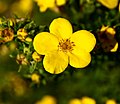Dasiphora
| Dasiphora | |
|---|---|

| |
| Dasiphora fruticosa in flower | |
| Scientific classification | |
| Kingdom: | Plantae |
| Clade: | Tracheophytes |
| Clade: | Angiosperms |
| Clade: | Eudicots |
| Clade: | Rosids |
| Order: | Rosales |
| Family: | Rosaceae |
| Subfamily: | Rosoideae |
| Tribe: | Potentilleae |
| Subtribe: | Fragariinae |
| Genus: | Dasiphora Raf. |
| Species | |
|
See text | |
| Synonyms | |
|
Comocarpa Rydb. 1898 | |
Dasiphora is a genus of shrubs in the rose family Rosaceae, native to Asia, with one species D. fruticosa (shrubby cinquefoil), ranging across the entire cool temperate Northern Hemisphere. In the past, the genus was normally included in Potentilla as Potentilla sect. Rhopalostylae,[1] but genetic evidence has shown it to be distinct.[2][3][4]
The leaves are divided into five (occasionally three or seven) leaflets arranged pinnately, whence the name cinquefoil (French, cinque feuilles, "five leaves").
Species[edit]
As of April 2023[update], Plants of the World Online accepts the following species:[5]
| Image | Scientific name | Distribution |
|---|---|---|
| Dasiphora arbuscula (D.Don) Soják | Himalaya to Tibet | |
| Dasiphora dryadanthoides Juz. | Central Asia to Himalaya. | |
 |
Dasiphora fruticosa (L.) Rydb. (syn. Potentilla fruticosa) | Temp. Northern Hemisphere. |
| Dasiphora galantha (Soják) Soják | Qinghai to China (Sichuan, Yunnan) | |
 |
Dasiphora glabra (G.Lodd.) Soják (syn. Potentilla glabra) | China |
| Dasiphora glabrata (Willd. ex Schltdl.) Soják (syns. Dasiphora davurica, Potentilla davurica, Potentilla fruticosa subsp. glabrata, Potentilla glabrata) | SE. Siberia to NE. China | |
| Dasiphora gorovoii Pshenn. | E. Primorye | |
 |
Dasiphora mandshurica (Maxim.) Juz. | S. Russian Far East to China and N. Korea. |
 |
Dasiphora parvifolia (Fisch. ex Lehm.) Juz. (syn. Potentilla parvifolia) | Central Asia to Siberia and N. & W. China. |
 |
Dasiphora phyllocalyx Juz. | Afghanistan to Central Asia and Pakistan |
| Dasiphora spectabilis (Businský & Soják) Businský & Soják | Tibet. |
The Flora of China also includes Potentilla bifurca (syn. Sibbaldianthe bifurca) and P. imbricata (syn. Sibbaldianthe imbricata) in this group,[1] but these species (which are not shrubs) do not have published combinations in Dasiphora.[6]
References[edit]
- ^ a b Flora of China: Potentilla sect. Rhopalostylae
- ^ Germplasm Resources Information Network: Dasiphora Archived 2000-10-21 at the Wayback Machine
- ^ Eriksson, T. et al. (2003). The phylogeny of Rosoideae (Rosaceae) based on sequences of the internal transcribed spacers (ITS) of nuclear ribosomal DNA and the trnL/F region of chloroplast DNA. Int. J. Pl. Sci. 164: 197–211.
- ^ Feng, Tao; Moore, Michael J.; Yan, Min‐Hui; Sun, Yan‐Xia; Zhang, Hua‐Jie; Meng, Ai‐Ping; Li, Xiao‐Dong; Jian, Shu‐Guang; Li, Jian‐Qiang & Wang, Heng‐Chang (2017). "Phylogenetic study of the tribe Potentilleae (Rosaceae), with further insight into the disintegration of Sibbaldia" (PDF). Journal of Systematics and Evolution. 55: 177–191. doi:10.1086/346163. Retrieved 2022-05-28.
- ^ "Dasiphora Raf. - Plants of the World Online". Plants of the World Online. 2020-08-08. Retrieved 2023-04-24.
- ^ International Plant Names Index: Dasiphora
